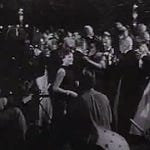The most influential movie I have ever been a part of, is The Celluloid Closet, directed by Rob Epstein and Jeffrey Friedman.
This Friday, December 12th, I’ll be presenting a Behind-The-Scenes screening of the Celluloid Closet, in Ithaca, New York.
Where: Grayhaven Motel Lounge
When: Movie Screening and talk, December 12th at 5:00 PM.
The historical documentary is based on the eponymous book by Vito Russo, which looked at the “secret” gay life of Hollywood and how the closet and taboos of sexuality are woven indelibly into the history of American cinema.
We made this film because we loved, and I do mean LOVED, our friend Vito Russo. Vito died all too young from the illnesses prompted by AIDS. He was one of the pandemic losses that our generation has never recovered from.
I met Vito when he was still hanging in there, teaching at U.C. Santa Cruz, and living in one of the palm tree-festooned, turquoise mid-century motels down in Beach Flats. His messy room was covered in VHS and Betamax tapes, a movie lovers den. We ate and drank and the world’s greatest raconteur held forth.
Vito is the one who inspired me to create my own “show-and-tell” movie programs, “How to Read a Dirty Movie,” and “All Girl Action.” —Because no one could draw you into film history like Vito. He, indeed was the original Mister “How to Read” a Movie, ANY movie. He basically wrote the script for us before his passing.
I remember his home tapes of Bette Midler in Washington Square Park at one of the earliest gay liberation celebrations. His constant phone calls from the most beloved actors and writers in the industry, including many of us who later appeared in the movie: Lily Tomlin, Army Maupin, Jay Presser Allan, Gore Vidal.
You’d go over to his house ready to cry, because we all knew what was coming—but then you’d forget the world. Vito was life itself, like his name. If anyone could cheat death and laugh in its face, it had to be him.
Shortly after his death, Michael Lumpkin, then the director of Frameline, called me to say he was producing a film version of C.C with mutual friends.
“Well, I will do anything. I will scrub floors,” I said.
Michael had something else in mind. Jeff and Rob asked me if I could watch a dozen classic Hollywood movies and be ready to be a talking head on camera for each.
“Like, when are we talking?”
“We need you ready by tomorrow.”
People who love Celluloid Closet often tell me that my commentary and emotion made them cry. Especially the clip, above, about The Children’s Hour.
Well, I really meant every word I said— but I had been up all night, too.
We knew the documentary was outstanding. The talent and care was our tribute to Vito’s gifts, the way he loved us. I never thought anyone beside the queer intelligentsia would see this film.
I was so wrong.











